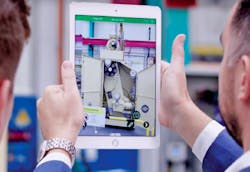In the complex world of pharma, making data-driven manufacturing decisions can be a key competitive advantage in all phases of production — from drug development to shipping final products.
“The life science sector is under increasing pressure from social forces: Life expectancy is increasing while chronic diseases are on the rise,” says Travis Graham, international account manager, Life Sciences Industry, Schneider Electric. “Combine this with key market demands like managing cost and pricing, stricter compliance requirements and higher bars for driving clinical innovation, and it’s no wonder life science companies are seeking connected technologies that can help overcome these increasing and shifting challenges.”
Of course the key to leveraging data isn’t just having it, but employing tools that quickly deliver performance feedback with an easy-to-implement system. Here are some of the innovative products pharma vendors have created to help manufacturers leverage data to make everyday decisions smarter and more profitable.
Improving productivity
In an industrial setting, small mishaps — from malfunctioning equipment to inefficient procedures — can add up to big losses. To help facility managers make sense of data inputs from various instruments throughout the pharma plant, Rite-Hite has developed the Opti-Vu Platform to aid in process and safety improvements.
“While other offerings provide simple raw data collected by various sensors, Opti-Vu distills the data into actionable insights by comparing current and historical data and analytics,” says Tim Kubly, business development manager at Rite-Hite. “Customers are able to create corrective action plans, helping to improve profitability and reduce risk while intuitive dashboards display trending information to drive behavioral and process changes.”
Schneider’s specialized suite of smart manufacturing apps promote real-time, data-driven decision making.
According to Rite-Hite, the platform delivers vital insights by applying analytics to correlate developing trends with historical data, helping to proactively identify improvement opportunities.
Schneider Electric’s new modular suite of software and digital services for industrial enterprises, called EcoStruxure Plant Performance Advisors, also helps pharma manufacturers quickly turn the volumes of data they produce into actionable insights to help modernize and scale up production.
“In the past, production speed was paramount, but now with the requirements for clear audit trails with precise documentation, the focus has changed,” Graham explains.
Schneider Electric says that the EcoStruxure enables pharma and life science companies to produce more while maintaining compliant systems and improving sustainability. The various solutions within the suite help eliminate resource waste, ensure equipment uptime and efficiency through predictive maintenance, offer augmented reality for better decision-making and add cybersecurity layers to remote asset diagnostics and maintenance.
Optimizing workflows
In drug manufacturing, supply chains for every product can be scattered between several suppliers or contract organizations. According to Joe DiMartino, Luminata solution manager at ACD/Labs, which specializes in software for R&D, this has prompted many companies to seek tools “designed specifically with manufacturing workflows in mind, to ease collaboration through robust and facile sharing of chemical and analytical information.”
To meet this need, ACD/Labs created Luminata, a software application that helps organizations effectively connect and manage the analytical and chemical data used for CMC and risk-mitigating data-driven decisions, from early development through to manufacturing. Luminata supports route and product development, impurity control, drug product and substance stability testing, formulation development, and provides tools to track batch genealogy for substances that may be manufactured by multiple suppliers. The software has been adopted by pharmaceutical organizations that are widely deploying it to hundreds of users with reported time savings of 30-60 percent per full-time equivalent employee (FTE).
Improving shipping
The use of data is also increasing in pharma shipping and distribution where temperature issues can arise.
“Technology is disrupting cold chain distribution and gaining more traction as the Internet of Things (IoT) progresses,” says Adam Tetz, director of worldwide marketing at Pelican BioThermal. “Pharma manufacturers are asking for real-time tracking of location, and ambient and payload temperature.”
Rite-Hite’s Opti-Vu delivers insights by applying analytics to correlate developing trends with historical data.
Pelican BioThermal’s new version of its Crēdo ProEnvision asset management tracking and tracing software helps pharma companies manage that complex data — current location, components fixed, etc. — for each of its Crēdo Cube shippers. The tool also enables companies to see the status of their shipper fleet while taking advantage of the performance provided by their reusable temperature-controlled shippers.
The company says that in the near future it also plans to release new software versions to leverage the Crēdo ProEnvision platform for predictive analytics. The updates will be designed to create more varied data collection, empowering pharmaceutical manufacturers and their logistics partners to better assess challenges associated with shipping.


